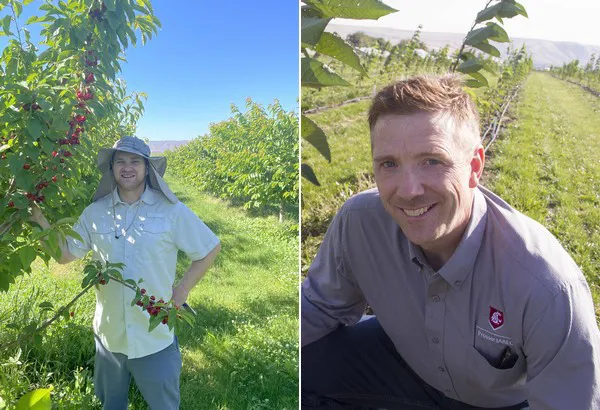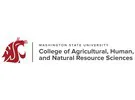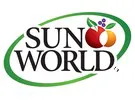Sun World International and Washington State University have joined forces to develop a new generation of high flavor sweet cherries that ripen earlier and are more practical to grow.
Horticulture associate professor and stone fruit breeder Per McCord and Sun World scientists are sharing germplasm from promising cherry varieties under a new research collaboration launched this spring. The agreement allows researchers to exchange and study genetic material from their respective collections aimed at speeding up breeding and release of improved varieties for orchards in the Pacific Northwest, California, the greater Northwest and worldwide.
“Pursuing partnerships such as the WSU and Sun World collaboration is a key priority. We continue to focus on partnerships that enable us to develop varieties that meet the demands of growers and consumers in a dynamic marketplace,” said Jennifer Petersen, chief science officer at Sun World.
 Left to right: Dr. Terence Frett, Per McCord
Left to right: Dr. Terence Frett, Per McCord
"Sun World has desirable germplasm and we have material they can benefit from," McCord said. "Now, we're able to share our parental varieties for new crosses, and potentially, high quality releases."
“Our combined research efforts will result in the development of novel cherry varieties with strong consumer appeal and desirable to growers. We will enable growers around the world to produce these WSU-Sun World varieties,” said Sun World’s sweet cherry breeder and molecular specialist Dr. Terrence Frett.
Germplasm is genetic material found inside pollen and seeds. Plants exchange germplasm to reproduce, and fruit breeders seek out promising parent plants with desired traits, crossing them with other varieties to develop new and better varieties.
 Cherry breeding at WSU dates to the 1950s when USDA Scientist Howard Fogle developed the Rainier cherry, released in 1960. Today, McCord seeks cherries with large fruit size, excellent firmness and flavor, superb postharvest qualities and cracking and disease resistance adapted to the cooler climates of the Pacific Northwest.
Cherry breeding at WSU dates to the 1950s when USDA Scientist Howard Fogle developed the Rainier cherry, released in 1960. Today, McCord seeks cherries with large fruit size, excellent firmness and flavor, superb postharvest qualities and cracking and disease resistance adapted to the cooler climates of the Pacific Northwest.
Sun World's germplasm has been developed over a 17-year period with the same objectives, and an added focus on developing low- and mid-chill cherry varieties adaptable to the hot California climate and similar regions around the world. This offers cherry varieties with better consistency in quality that are less susceptible to sunburn, heat damage and sutures, a defect that causes a deep cleft in the fruit. Being able to harvest a variety early in the season is an especially desired trait as it expands the window of availability.
Development of new varieties takes a decade or more, as breeders like WSU and Sun World compare and winnow out hundreds of different crosses in a series of orchard trials.
The partnership also offers opportunities for collaboration in breeding and research. Both programs continue to expand their knowledge and use of DNA molecular markers associated with important breeding traits, Frett said.
 For more information:
For more information:
Jennifer Petersen
Sun World International
Tel: +1(530) 379.8321
https://www.sun-world.com/
